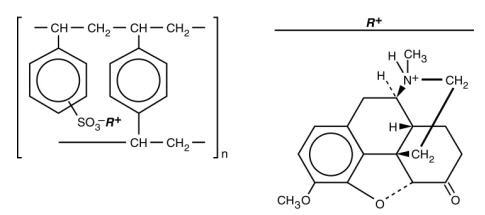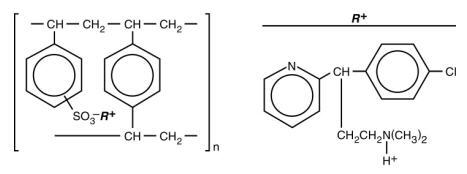
Tussionex Pennkinetic Extended-release while Breastfeeding
What is Tussionex Pennkinetic Extended-release used for?
What are the risk associated with Tussionex Pennkinetic Extended-release usage while breastfeeding? What precautions shall I take while using it in breastfeeding?

Nursing Mothers It is not known whether this drug is excreted in human milk. Because many drugs are excreted in human milk and because of the potential for serious adverse reactions in nursing infants from TUSSIONEX Pennkinetic Extended-Release Suspension, a decision should be made whether to discontinue nursing or to discontinue the drug, taking into account the importance of the drug to the mother.
Tussionex Pennkinetic Extended-release Breastfeeding Analsys
Hydrocodone bitartrate while Breastfeeding
Low RiskCAS Number: 125-29-1
Not commercially available in Spain
Chlorpheniramine maleate while Breastfeeding
Low RiskCAS Number: 132-22-9
First generation antihistaminic and alchylamine drug, with sedative effect. Its active isomer is Dexchlorfeniramine. Likely inhibition of lactation within the first weeks post delivery because anti-prolactin effect.. Short-term and low dose (2 mg one or twice-day) treatment is compatible with breastfeeding. Be aware of somnolence in the child. For long-term treatment an alternative drug should be preferred. Compounds in association with expectorants, corticoids and cough relief medicines are available. Avoid drug associations especially while breastfeeding. Follow-up for sedation and feeding ability of the infant. Bed-sharing is not recommended for mothers who are taking this medication.
Tussionex Pennkinetic Extended-release Breastfeeding Analsys - 2
Hydrocodone bitartrate while Breastfeeding
CAS Number: 125-29-1

Hydrocodone is a opioid narcotic. Benzhydrocodone is a hydrocodone prodrug that is rapidly converted into hydrocodone in the gastrointestinal tract. Maternal use of oral narcotics during breastfeeding can cause infant drowsiness, central nervous system depression and even death. Newborn infants seem to be particularly sensitive to the effects of even small dosages of narcotic analgesics. Once the mother's milk comes in, it is best to provide pain control with a nonnarcotic analgesic and limit maternal intake of oral hydrocodone to a few days at a maximum dosage of 30 mg daily with close infant monitoring. If the baby shows signs of increased sleepiness (more than usual), difficulty breastfeeding, breathing difficulties, or limpness, a physician should be contacted immediately.
Chlorpheniramine maleate while Breastfeeding
CAS Number: 132-22-9
Small (2 to 4 mg), occasional doses of chlorpheniramine are acceptable during breastfeeding. Larger doses or more prolonged use might cause effects in the infant or decrease the milk supply, particularly in combination with a sympathomimetic such as spseudoephedrine or before lactation is well established. Single bedtime doses after the last feeding of the day may be adequate for many women and will minimize any effects of the drug. The nonsedating antihistamines are preferred alternatives, though.

What should I do if I am breastfeeding mother and I am already exposed to Tussionex Pennkinetic Extended-release?
Tussionex Pennkinetic Extended-release is in the category of low risk, if you have already used it then its not a big deal if health and behavior of baby is good. However your health care provider shall be aware of the fact that you have used Tussionex Pennkinetic Extended-release so you should inform him based on your convenience.
I am nursing mother and my doctor has suggested me to use Tussionex Pennkinetic Extended-release, is it safe?
Tussionex Pennkinetic Extended-release comes in category of low risk and if your doctor is aware that you are breastfeeding it should be ok to use
If I am using Tussionex Pennkinetic Extended-release, will my baby need extra monitoring?
Not much monitoring required while using Tussionex Pennkinetic Extended-release
Who can I talk to if I have questions about usage of Tussionex Pennkinetic Extended-release in breastfeeding?
US
National Womens Health and Breastfeeding Helpline: 800-994-9662 (TDD 888-220-5446) 9 a.m. and 6 p.m. ET, Monday through Friday
UK
National Breastfeeding Helpline: 0300-100-0212 9.30am to 9.30pm, daily
Association of Breastfeeding Mothers: 0300-330-5453
La Leche League: 0345-120-2918
The Breastfeeding Network supporter line in Bengali and Sylheti: 0300-456-2421
National Childbirth Trust (NCT): 0300-330-0700
Australia
National Breastfeeding Helpline: 1800-686-268 24 hours a day, 7 days a week
Canada
Telehealth Ontario for breastfeeding: 1-866-797-0000 24 hours a day, 7 days a week
